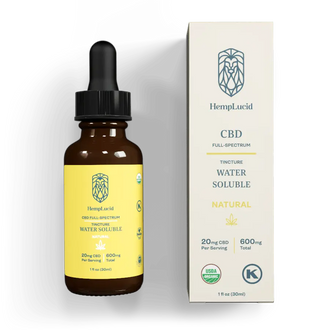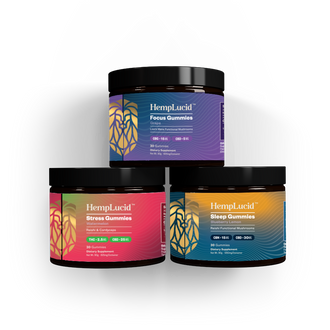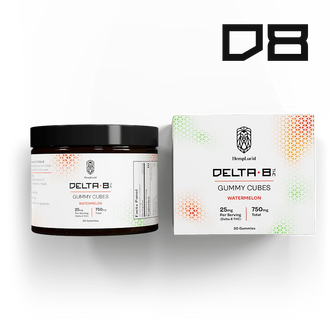
Does CBD Get You High? CBD, Drug Tests, & Psychoactivity
Does CBD get you high? Is it actually non-psychoactive? Will CBD show up on a drug test? We're here to shed some light on a few CBD misconceptions.
“Does CBD get you high?”
“Can you fail a drug test due to CBD use?”
These are common questions because of hemp’s relation to marijuana (both are members of the cannabis plant family) and the trace amounts of THC (delta-9 tetrahydrocannabinol) found in whole-plant hemp extracts.
Hemp is defined as cannabis with a THC content of less than 0.3%—anything higher enters “marijuana” territory.
Most people differentiate CBD and THC by describing THC as a psychoactive cannabinoid that causes the “high” associated with marijuana. CBD is attributed as a non-psychoactive cannabinoid.
But is CBD actually non-psychoactive?
Is CBD Psychoactive?
The word “psychoactive” is defined as “affecting the mind,” or something that affects the way the brain and nervous system works.
Describing cannabidiol (CBD) as a non-psychoactive cannabinoid is widely accepted, but may stem from confusion between the definition of psychoactivity and intoxication.
New information has come to light in recent years that suggests CBD interacts directly with CB1 receptors in the Endocannabinoid System, but docks at a different binding site than THC.
Cell membranes have several receptors to match a variety of messenger molecules that influence that cell’s activity. In other words, they have multiple binding sites beyond the primary site.
CB1 Cannabinoid Receptors
THC is known for causing the high associated with marijuana by interacting with CB1 cannabinoid receptors. This effect is caused when THC binds to CB1 receptors at what is called an orthosteric binding site (meaning the primary binding site).
CBD also affects CB1 receptors but is considered an allosteric modulator. It doesn’t bind with CB1 receptors in the same way THC does.
Instead, it fits into a secondary site (called an allosteric binding site) and acts as an allosteric modulator, changing the shape of the receptor to affect cell signaling. This modulation can only occur if another cannabinoid (or endocannabinoid) is already present at the primary binding site.
If THC and CBD both interact with CB1 receptors, and those receptors are most concentrated in the brain and central nervous system, are both cannabinoids psychoactive? Short answer: yes.
THC is psychoactive, and a product of that psychoactivity is a euphoric “high” effect.
CBD directly affects systems present in the brain and nervous system, and so must also be considered psychoactive—but that’s not a bad thing.
If CBD was non-psychoactive, it would offer little in the way of benefits. It’s better to think of CBD as non-intoxicating, rather than non-psychoactive.
Will CBD Get You High?
The concern here likely comes from the stigma surrounding cannabis and the trace amounts of THC present in whole-plant hemp extracts.
THC can definitely get you high, but the amount found in hemp (<0.3%) isn’t enough to reach intoxicating levels with normal use.
CBD and trace amounts of THC, alongside an array of secondary cannabinoids, work together to produce a therapeutic synergy within the body called the entourage effect. The subtle benefits of Whole-Plant Hemp CBD Oil can be felt without any intoxicating effects.
Hemp-derived CBD promotes homeostasis—a balance in the body’s essential physiological processes—without the “high” associated with marijuana.
Does CBD Show Up on a Drug Test?
The answer to this question is a bit more complicated and will depend on the product, dosage, and the type of drug test being administered.
Drug tests don’t test specifically for CBD but may check for THC and its metabolite THC-COOH (formed after the body metabolizes THC).
Let’s go over a handful of drug tests that can be administered.
Urine Test
A urinalysis is the most common drug testing method for pre-employment screenings or random drug tests in the workplace.
These tests are developed with a sensitive immunoassay that detects THC and its metabolite THC-COOH.
A positive test result is triggered when levels of THC and metabolites detected in urine exceed a set threshold. These tests can detect regular THC use after a period of several days or weeks.
Saliva Test
Unlike a urinalysis that checks for THC metabolites, saliva tests only look for THC on the lining of the mouth before it’s metabolized. Saliva tests are generally administered to detect recent or same day drug use.
Hair Follicle Test
Hair follicle drug tests require a small sampling of hair (100-120 strands) collected under supervision. Washing your hair, hair dye, and styling products will not affect the accuracy of these tests.
These tests are used to detect repeated drug use up to 90 days before the test. Drugs present in the bloodstream become part of hair cells as hair grows.
Hair follicle tests are not designed to detect recent drug use and instead checks for chronic use of a substance.
Can You Fail a Drug Test Due to CBD Use?
The tests mentioned above all have a specific threshold for THC and its metabolites, and individual tests will vary.
At HempLucid, we value honesty and lucidity, and we won’t deny the rare possibility of failing a drug test when using whole-plant CBD. It’s highly unlikely the trace THC content (always less than 0.3%) in our products will trigger a positive result, but the risk may increase when regularly consuming higher servings.
If you’re looking to avoid THC altogether, THC-free CBD options are also available.
Our THC-free CBD products are tested at several intervals of the manufacturing process to ensure they are completely free of THC.
In exceedingly rare cases, it may be possible to trigger a false positive on a urinalysis due to the presence of metabolites created by CBD.
Triggering a positive test result is highly unlikely and will depend on the quality of the initial drug test, the individual being tested, and the amount of CBD being consumed.
That said, a false positive is still theoretically a possibility.
If a false positive occurs, a more precise confirmatory GC-MS test (gas chromatography-mass spectrometry) is administered. These screenings are incredibly accurate (not to mention far more expensive) and are only used as a follow-up to verify the validity of the initial test result.
Summary: Psychoactivity, Intoxication, and Drug Tests
In summary, saying CBD is non-psychoactive is inaccurate—but that’s not a bad thing. When a substance is psychoactive, it just means it affects the way the brain and nervous system works.
The benefits of CBD are certainly the result of psychoactivity, but CBD (whether whole-plant or isolate) will not get you high.
It’s more accurate to describe CBD as a non-intoxicating cannabinoid.
Hemp-derived CBD products should not show up on a drug test, but there is a slim chance of triggering a false positive. This will vary depending on the person, their CBD use, and the type of test being administered.
If you’re concerned about failing a drug test, purchasing an at-home drug test is a great way to provide peace of mind.
HempLucid family products are always third-party tested and regulation compliant. You can review the contents of our CBD by scanning the QR code on product packages, or by entering your lot code on our test results page.

Suggested Products from This Article

 WATER SOLUBLE
WATER SOLUBLE
Organic Full-Spectrum Water Soluble CBD - Natural Flavor

 EDIBLES
EDIBLES
Focus Sleep Stress - Herb & Mushroom CBN THC CBG CBD Gummies

 EDIBLES
EDIBLES



